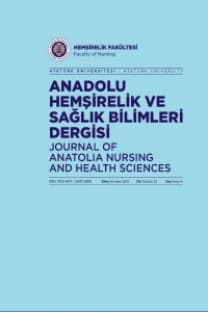ANNELERİN DOĞUM SONU YAŞAM KALİTESİNİN BELİRLENMESİ
Doğum sonu dönem;; yaşam kalitesi;; hemşire.
Postpartum; quality of life; nurse.,
___
- Altuntuğ K, Ege E. Doğum Sonu Yaşam Kalitesi Ölçeği’nin Türkçe Uyarlamasının Geçerlik ve Güvenirliği. Anadolu Hemşirelik ve Sağlık Bilimleri Dergisi 2012; 15(3): 214-22.
- Atıcı İ, Gözüm S. Postpartum Erken Dönemde Lohusalara Verilen Sağlık Eğitiminin Postpartum Problem ve Anksiyeteleri Üzerine Etkileri. HÜHYO Dergisi 2000; 8(2): 77-90.
- Balkaya A. Postpartum Dönemde Annelerin Bakım Gereksinimleri ve Ebe-Hemşirenin Rolü. CÜHYO Dergisi 2002; 6(2): 42-9.
- Başer M, Mucuk S, Korkmaz Z, Seviğ Ü. Postpartum Dönemde Anne ve Babaların Yenidoğan Bakımına İlişkin Gereksinimlerinin Belirlenmesi. Sağlık Bilimleri Dergisi 2005;; 14(Ek Sayı:
- Hemşirelik Özel Sayısı): 54-8. Bergström, M, Kieler H, Waldenström U. Effects of Natural Childbirth Preparation Versus Standard Antenatal Education on Epidural Rates, Experience of Childbirth and Parental Stres in Mothers and Fathers: A Randomised Controlled Multicentre Trial. BJOG 2009; 116(9): 1167-76.
- Beydağ KD. Doğum Sonu Dönemde Anneliğe Uyum ve Hemşirenin Rolü. TSK Koruyucu Hekimlik Bülteni 2007;; 6(6): 479-84.
- Chen CH, Wong SY, Chang MY. Women’s Perceptions of Helpful and Unhelpful Nursing Behaviors During Labor: A Study in Taiwan. Birth 2001; 28(3): 180-5.
- Cleeton ER. Attitudes and Beliefs about Childbirth among College Students: Result of an Educational Intervention. Birth 2001; 28(3): 192-201.
- Coşar F, Demirci N. Lamaze Felsefesine Dayalı Doğuma Hazırlık Eğitiminin Doğum Algısı ve Doğuma Uyum Sürecine Etkisi. S.D.Ü Sağlık Enstitüsü Dergisi 2012;; 3(1): 18-30.
- Doğaner G, Bekar M. Vajinal Yolla Doğum Yapan Kadınların Erken Postpartum Dönemde Kendisinin ve Yenidoğanın Bakımına Yönelik Yaşadıkları Sorunların Belirlenmesi. Sağlık ve Toplum Dergisi 2006; 16(4): 130-5.
- Emmanuel EN, Sun J. Health Related Quality of Life Across The Perinatal Period Among Australian Women. J Clin Nursing 2014; 23(11-12): 1611-9.
- Gölbaşı Z. Postpartum Erken Taburculuk, Evde Bakım Hizmetleri ve Hemşirelik. CÜHYO Dergisi 2003; 7(2): 15-22.
- Gözüm S, Kılıç D. Health Problems Related to Early Discharge of Turkish Women. Midwifwery 2005; 21(4): 371-8.
- Güngör A. Dördüncü Dünya Kadın Konferansı. Kadın Haklarına İlişkin Uluslararası Hukuk Düzenlemeleri. Ankara: Koza Matbaacılık;; 2012. p.37-225.
- Güngör İ, Gökyıldız Ş, Nahcivan NÖ. Sezeryan Doğum Yapan Bir Grup Kadının Doğuma İlişkin Görüşleri ve Doğum Sonu Erken Dönemde Yaşadıkları Sorunlar. İ.Ü.F.N.Hemşirelik Yüksekokulu Dergisi 2004;; 13(53): 17-24.
- Hacettepe Üniversitesi Nüfus Etütleri Enstitüsü. Türkiye Nüfus ve Sağlık Araştırması, 2008. Hacettepe
- Üniversitesi Nüfus Etütleri Enstitüsü, Sağlık Bakanlığı Ana Çocuk Sağlığı ve Aile Planlaması Genel Müdürlüğü, Başbakanlık Devlet Planlama Teşkilatı Müsteşarlığı ve TÜBİTAK, Ankara, Türkiye, 2009. p. 154-158.
- Hammoudeh W, Mataria A, Wick L, Giacaman R. In Search of Health: Quality of Life Among Postpartum Palestinian Women. Expert Rev Pharmacoecon Outcomes Res 2009; 9(2): 123-32.
- Hill P, Aldag JC, Hekel B, Riner G, Bloomfield P. Maternal Postpartum Quality of Life Questionnaire. J Nurs Meas 2006; 14(3): 205-20.
- Hill P, Aldag JC. Maternal Perceived Quality of Life Following Childbirth. JOGNN 2007; 36(4): 328-34.
- Kiehl EM, White MA. Maternal Adaptation During Childbearing in Norway, Sweden and United States. Scand J Caring Sci 2003; 17(2): 96-103.
- Kitapçıoğlu G, Yanıkkerem E, Sevil Ü, Yüksel D. Gebelerde Doğum ve Postpartum Döneme İlişkin Endişeler;; Bir Ölçek Geliştirme ve Validasyon Çalışması. Adnan Menderes Üniversitesi Tıp Fakültesi Dergisi 2008;; 9(1): 47-54.
- Mucuk S, Güler N. Annelerin Doğum Sonu Dönemde Bakım Beklentileri ve Bu Beklentilerinin Hemşireler Tarafından Karşılanma Durumu. EÜSB Dergisi 2001; 11(1): 21-9.
- Perla L. Patient Compliance and Satisfaction with Nursing Care During Delivery and Recovery. J Nurs Care Qual 2002; 16(2): 60-6.
- Pınar G, Doğan N, Algıer L, Kaya N, Çakmak F. Annelerin Doğum Sonu Konforunu Etkileyen Faktörler. Dicle Tıp Dergisi 2009;; 36(3): 184-90.
- Saurel-Cubizolles MJ, Romito P, Lelong N, Ancel PY. Women’s Health after Childbirth: A Longitudinal Study in France and Italy. BJOG 2000; 107(10): 1202Şahin N, Dinç H, Dişsiz M. Gebelerin Doğuma İlişkin Korkuları ve Etkileyen Faktörler. Zeynep Kamil Tıp Bülteni 2009;; 40(2): 57-62.
- Şahin NH, Güngör İ, Sömek A. Kadınların Doğum Yöntemlerine İlişkin Görüşleri ve Erken Postpartum Dönemdeki Sorunlarının Belirlenmesi. Jinekoloji ve Obstetrik Dergisi 2007; 21(4): 197-204.
- Taşkın L. Kadın sağlığına giriş. Doğum ve Kadın Sağlığı Hemşireliği. 10. Baskı. Ankara: Sistem Ofset Matbaacılık;; 2011. p.1-16.
- Torkan B, Parsay S, Lamyian M, Kazemnejad A, Montazeri A. Postnatal Quality of Life in Women after Normal Vaginal Delivery and Caesarean Section. BMC Pregnancy & Childbirth 2009; 9(4): 1
- Walker L, Wilging S. Rediscovering the ‘M’ in ‘MCM’: Maternal Health Promotion after Childbirth. JOGNN 2004; 29(3): 229-35.
- Waterstone M, Wolfe C, Hooper R, Bewley S. Postnatal Morbidity after Childbirth and Severe Obstetric Morbidity. BJOG 2003; 110(2): 128-33.
- World Health Organization (WHO). Maternal and Newborn Health/Safe Motherhood Unit. Postpartum care of the mother and newborn: a practical guide. Geneva: World Health Organization; 1998. p. 16-23.
- ISSN: 1309-5471
- Yayın Aralığı: Yılda 4 Sayı
- Yayıncı: Atatürk Üniversitesi Hemşirelik Fakültesi
Evşen NAZİK, Gürsel ÖZTUNÇ, Berksoy ŞAHİN
YETİŞKİN SAĞLIK OKURYAZARLIĞI ÖLÇEĞİ’NİN GELİŞTİRİLMESİ
GEÇERLİK VE GÜVENİRLİK ÇALIŞMALARINDA DOĞRULAYICI FAKTÖR ANALİZİNİN KULLANIMI
ANNELERİN DOĞUM SONU YAŞAM KALİTESİNİN BELİRLENMESİ
Asli SİS ÇELİK, Nihan TÜRKOĞLU, Türkan PASİNLİOĞLU
HEMŞİRELİK ÖĞRENCİLERİNİN ÜSTBİLİŞ DÜZEYLERİNİN ÇEŞİTLİ DEĞİŞKENLER AÇISINDAN İNCELENMESİ
Feyza NAZİK, Mehtap SÖNMEZ, Gülsen GÜNEŞ
HEMŞİRELERİN PROFESYONEL TUTUMLARI İLE BUNU ETKİLEYEN FAKTÖRLERİN İNCELENMESİ
Yurdanur DİKMEN, Melike YÖNDER, Songül YORGUN, Yasemin YILDIRIM USTA, Sema UMUR, Aynur AYTEKİN
MEDYANIN KADIN ESTETİĞİ ÜZERİNE ETKİLERİ VE EBENİN ROLÜ
ERGENLERİN SAĞLIKLI YAŞAM BİÇİMİ DAVRANIŞLARININ DEĞERLENDİRİLMESİ
Meltem KARADAMAR, Rana YİĞİT, Mehmet Ali SUNGUR
BASINÇ YARASI GELİŞİMİNDE PERFÜZYON DEĞERLERİNİN ETKİSİ
Elçin ÜLKER EFTELİ, Ülkü GÜNEŞ
DOĞUM EYLEMİNDE BEL AĞRISININ HAFİFLETİLMESİNDE İNTRADERMAL STERİL SU ENJEKSİYONU
